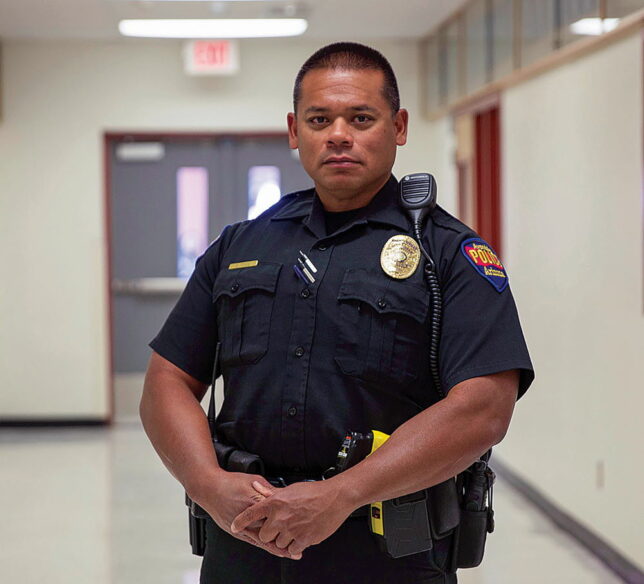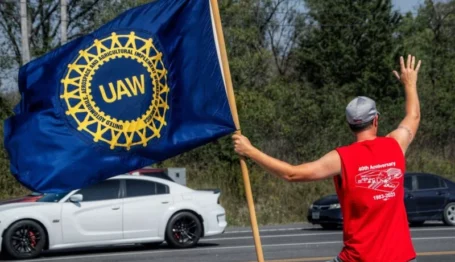Labor Watch
Teachers Unions and the Lowering of Standards: Behavior Standards
 The NEA policy statement stops short of explicitly calling for the removal of law enforcement from schools but instead discourages funding of school resource officers and limiting the growth of officers in schools. Credit: Faith Miller. License: https://bit.ly/40eFEpQ.
The NEA policy statement stops short of explicitly calling for the removal of law enforcement from schools but instead discourages funding of school resource officers and limiting the growth of officers in schools. Credit: Faith Miller. License: https://bit.ly/40eFEpQ.

Teachers Unions and the Lowering of Standards (full series)
Teaching in Compton | Behavior Standards
Academic Standards | Black Education Success Stories
Behavior Standards: The Push to Limit Suspensions and SROs
First, consider the teachers unions stance on behavioral standards. Perhaps no document encapsulates the general tone of lowering the bar on behavior for school children more than Obama Administration’s 2014 letter to our nation’s schools called the Joint Dear Colleague on the Nondiscriminatory Administration of School Discipline.
In July 2022, the National Education Association (NEA), America’s most prominent teacher’s union, issued a statement that among other things promoted “restorative justice” and the “elimination of inequities in student discipline and the policing of students on campus.” In short, the letter directed schools to punish behavior less, especially among minority students. It accused our nation’s teachers and school administrators of racism and that black and brown students had higher suspensions and other disciplinary actions against them were not due to any higher incidence of behavioral issues by them but rather because of the racist discrimination of the adults. The NEA’s statement supporting the Dear Colleague letter echoes these sentiments and “emphasizes the NEA’s commitment to restorative justice, trauma-informed instruction, and cultural competence among educators so they can understand their own implicit biases.” At the NEA’s representative assembly, 93 percent of its delegates vote to support the policy statement.
So the teachers unions are pushing for less punishment and lowering behavioral standards, especially for minority students. Tardiness, misbehavior in class, direct defiance, and even the more severe infractions, such as drug possession and fighting, are all left relatively unpunished. Suspensions are discouraged. Students are given counseling instead of consequences. And they quickly learn they can get away with almost anything. The result is chaos.
During the Trump administration, Obama’s Dear Colleague letter was rescinded by Education Secretary Betsty DeVos. So-called progressives quickly condemntg the move in a letter from the Leadership Conference on Civil and Human Rights signed by the two most prominent teacher’s unions in America, the National Education Association and the American Federation of Teachers, claiming that “rescinding the guidance would send the opposite message: that the Department does not care that schools are discriminating against children of color by disproportionately kicking them out of school.” So according to the nation’s two most prominent teacher’s unions, if you suspend black or brown kids for misbehavior, you do not care about them.
With suspensions being discouraged and the resulting chaos that is the predictable outcome when consequences are removed, you’d think this guardrail against misbehavior would be replaced by SROs or in layman’s terms, what we’d call on-campus police officers. Surely if we remove consequences for things like fighting, the teacher’s unions would be wise enough to have at least more police officers on campus to avoid a Lord of the Flies disaster. You’d think that would be common sense. And you’d be wrong.
Not only are the teacher’s unions pushing for fewer suspensions, but they also want to curtail and defund the SROs. The NEA put out a statement on SROs to this effect. The policy statement stops short of explicitly calling for the removal of law enforcement from schools but instead discourages funding of SROs and limiting the placement of more officers in schools: “The newly approved policy statement “calls on NEA leaders and members to work toward models that restrict law enforcement activity to appropriate public safety roles and end the policing of students,” the task force’s report says. “In addition, we must provide models and leadership to limit the growth of the SRO workforce and ensure that precious school funding dollars are spent not on police but on staff and programs that enhance the well-being of all students.”
To be fair, NEA’s position has seemed to shift depending on the current news cycle and what is popular in their political circles. For example, after the tragic Sandy Hook school shooting, they promoted federal policies to grow SRO presence on school campuses. However, their position has shifted seemingly to the opposite conclusion, citing “institutional racism” as the reason for the about-face. “A lot of this stems from our decision to take on institutional racism,” said NEA President Becky Pringle.
What has been the reaction to this lax approach to school discipline? According to a survey by Teach Plus, “about half (49 percent) of Illinois’ teachers believe that eliminating zero-tolerance policies has had a negative impact on student behavior and school culture.” Teachers see the chaos. In another poll by Education Next, “just 29 percent of teachers said they support federal policies that prevent schools from expelling or suspending black and Hispanic students at higher rates than other students.” Interestingly, the same polls showed that blacks and Hispanics support school discipline policies at higher rates than whites, teachers, and the general public. So the minorities these policies are meant to benefit disagree with them. Ironic but not surprising to anyone familiar with minority communities.
We might excuse these policies for going against common sense and practices long affirmed by educational history if they produced better results. Sadly, they do not. After the Obama Dear Colleague letter went into practice, the number of “serious violent incidents” rose significantly, according to the National Center for Education Statistics. Rebecca Friedrichs, commenting at the 2020 Republican National Committee, put it succinctly when she said, “their lenient discipline policies morphed our schools into war zones.”
In the next installment, teachers unions work to lower academic standards.



